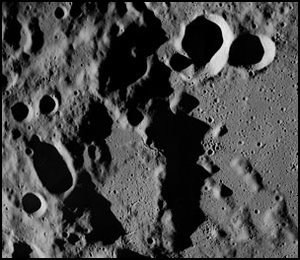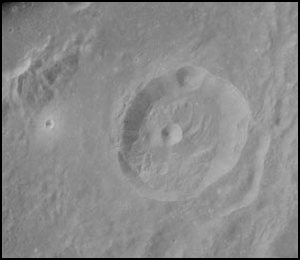-
 Frank Borman (CDR)
Frank Borman (CDR)
-
Okay. TEI 8, SPS/G&N: 45701, minus 040, plus 157 085:18:19.04, plus 33195, minus 01267, plus 04716 179 008 001, NA, plus 00187 33552 311 33355 42 09090 252, Dzuba down 060, left 4.2, plus 0773, minus 16500 12982 36256 146:46:18; Sirius, Rigel, 1.29 155 010, four-quad, 15 seconds, horizon 4 degrees at TIG.
-
 Mike Collins (CAPCOM)
Mike Collins (CAPCOM)
-
Roger. Some time back, we noted evidence of a restart in the computer and wondered if you had any remarks about it. Over.
-
 Frank Borman (CDR)
Frank Borman (CDR)
-
I know it. Jim got screwed up on one of those programs. He's getting kind of tired here, and we got a RESTART and a couple of PROGRAM ALARMS. I don't know what he did.
-
 Mike Collins (CAPCOM)
Mike Collins (CAPCOM)
-
Roger. In some of Jim's previous comments about the limb brightness as the sun was about to come up has sparked a lot of interest down here. And we'd like to ask him if he gets a chance to notice again or perhaps he can recall, whether there were any changes in the appearance of the stars. Such as, did he notice any twinkling while this was taking place, and did he notice any narrow limb brightening within 10 to 20 seconds prior to the sun's rising? Over.
-
 Jim Lovell (CMP)
Jim Lovell (CMP)
-
Houston, my comments concerning the sunrise was the comments above the terrain. There appeared what might be called diagonal light or light due to the haze or something like that. As the sun came above or before the sun came above the limb, definite rays could be seen coming from the other side. It was a uniform haze emanating from the center spot where the sun was going to rise, and this was something which I didn't expect.
-
 Mike Collins (CAPCOM)
Mike Collins (CAPCOM)
-
Roger, Jim. Understand. We copied that and just curious, and if you see it again whether you notice any stars twinkling or any additional information.
-
 Bill Anders (LMP)
Bill Anders (LMP)
-
Actually, he doesn't want to pass out too much of that information. He wants to save it and write a paper when he gets back, Mike.
-
 Frank Borman (CDR)
Frank Borman (CDR)
-
Okay. Well, I don't know if we can go that long with it, and I'm going to scrub all the other experiments, the converging stereo or other photography, and we are a little bit tired; I want to use that last bit to really make sure we're right for TEI.
-
 Mike Collins (CAPCOM)
Mike Collins (CAPCOM)
-
A couple of miscellaneous items for you: we'd like for you to discontinue charging battery B at this time; we'd also like to get a cryo stir, 2 minutes on all four; and your UP TELEMETRY IU switch, put to BLOCK, please, and you are GO for the next lunar orbit.
-
 Frank Borman (CDR)
Frank Borman (CDR)
-
Roger. I want to scrub these control point sightings on this next REV, too, and let Jim take a rest.
-
 Mike Collins (CAPCOM)
Mike Collins (CAPCOM)
-
I understand you want to scrub control points 1, 2, and 3 on the next REV and the converging stereo on the following REV.
-
 Mike Collins (CAPCOM)
Mike Collins (CAPCOM)
-
This REV coming up we would like to clarify whether you intend to scrub control points 1, 2, and 3, only, and do the pseudo landing site; or whether you also intend to scrub the pseudo landing site marks. Over.
-
 Frank Borman (CDR)
Frank Borman (CDR)
-
We're scrubbing everything. I'll stay up and try and keep the spacecraft vertical and take some automatic pictures, but I want Jim and Bill to get some rest.
Expand selection up Contract selection down Close -
 Mike Collins (CAPCOM)
Mike Collins (CAPCOM)
-
Apollo 8, Houston. Four minutes to LOS. You have control of the DSE now, and all your systems are looking good.
-
 Mike Collins (CAPCOM)
Mike Collins (CAPCOM)
-
Yes, we can hear him down here.
Expand selection down Contract selection up -
 Mike Collins (CAPCOM)
Mike Collins (CAPCOM)
-
We have 1 minute to LOS, Frank. You can terminate stirring up your cryos any time, and we agree with all your flight plan changes. Have a beautiful backside, and we will see you next time out.
-
 Ken Mattingly (CAPCOM)
Ken Mattingly (CAPCOM)
-
Roger, Apollo 8. Couple of notes for you: on the P52 you are coming up to on this REV, we've looked at your state vectors and all your information. The platform looks good, and it appears that it is your option if you would like to by-pass this P52, your platform will still be good at the following TEI pass. And we would like to have your PRD reading, and I guess we are behind the sleep summary. Over.
-
 Ken Mattingly (CAPCOM)
Ken Mattingly (CAPCOM)
-
Copy, 144. And we have an update ready to go into your computer for the state vector if you want to go to P00 and ACCEPT.
-
 Ken Mattingly (CAPCOM)
Ken Mattingly (CAPCOM)
-
Okay, Apollo 8. We have completed with the computer. You can use the VERB 47 to transfer, and I have the TEI 9 PAD.
-
 Frank Borman (CDR)
Frank Borman (CDR)
-
Okay. This PAD is a TEI 9, SPS/G&N: 45597, minus 040, plus 157 087:19:18.20, plus 34188, minus 01353, plus 00780 180 008 001, November Alfa, plus 00187 34223 313 34021 42 0898 253 033, down 131, left 28, plus 0758, minus 16500 12987 36277 146:48:16; primary star Sirius, secondary Rigel, 129 155 010; four quads, 15 second, ullage, horizons on 1.2-degree window line at T minus 3; use high speed procedure with minus Mike Alfa. After looking at the burn information from your previous SPS burns, it appears that the engine performance should give us a 3-second burn time, longer than what you have on the PAD. The PAD number should correspond with what you get out of the computer. So we have not factored this into the past data; however, you can anticipate the engine for a normal DELTA-V to give you a 3 second—3.7-second burn in excess of the computed times. Over.
-
 Frank Borman (CDR)
Frank Borman (CDR)
-
TEI 9, SPS/G&N: 45597, minus 040, plus 157 087:19:18.20, plus 34188, minus 01353, plus 00780 180 008 001, NA, plus 00187 34223 313 34021 42 0898 253 033, down 131, left 28, plus 0758, minus 16500 12987, plus—or 36277 146:48:16; and that's Sirius and Rigel 129 155 010, four jet, 15 seconds, 1.2 degrees on the window at T minus 3, high speed minus MA, engine 3.7 seconds longer than given.
-
 Ken Mattingly (CAPCOM)
Ken Mattingly (CAPCOM)
-
That's affirmative, Apollo 8. And when you get around to it, if you would like for us to dump your tape, we can do that when you get on the high gain.
-
 Ken Mattingly (CAPCOM)
Ken Mattingly (CAPCOM)
-
Apollo 8, we'll have one for you the next time around, and we'll update it if necessary on the following REV.
-
 Frank Borman (CDR)
Frank Borman (CDR)
-
Do you have any idea why quad B seems so much lower in quantity than the other three quads?
-
 Ken Mattingly (CAPCOM)
Ken Mattingly (CAPCOM)
-
Okay. It looks to us like, although we're reading out the same thing you are on the quad quantity, using the computer program and all of the correction factors that are in there, it looks like all four of your quads are very close. In pounds, it looks like you have, for example, 193 pounds in quad A and 189 in B, 200 in C, and 190 in Delta. And the difference that you read on the gage is attributed to the fact that you don't have all of the correction factors in there. This ground calculation has an accuracy of about plus or minus 6 percent, and the best you can do on board, even using your chart, is plus or minus 10 percent. Over.
Spoken on Dec. 24, 1968, 11:33 p.m. UTC (55 years, 11 months ago). Link to this transcript range is: Tweet


